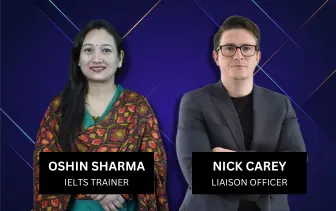
Announcements

Announcements

Meridean Overseas
Updated On 19 September 2024 & Read Time 8 minutes
3.4k
The speaking portion of the IELTS exam, where students must use speech to demonstrate their language skills, is a crucial component. Since they don't regularly communicate in English, some students may find this specific section of the exam intimidating. It's a three-part segment that lasts 11–14 minutes.

Today, we will discuss the second and third sections of the speaking test on the blog. These provide a topic for the cue card and a few follow-up questions. The student has a set amount of time to talk about and answer the questions. Let's get started! We've selected a frequently questioned cue card topic: "Describe a time when you received money as a gift."
Table of Contents
There are various traditions in India, and giving gifts is pretty common here. Indians prefer multiple ways to give gifts, and giving money is one of them. Today, I want to share an experience where I received money as a gift.
I have received money on various occasions and festivals, mainly during Raksha Bandhan, a festival largely celebrated in India.
I collected the money given to me by all my brothers and relatives and then gave it to my mother to save. Later, when a significant amount of money was collected, I took my mother and got her a new touch-screen mobile phone. It was when touch-screen phones were a new commodity in India.
I felt great after being able to gift her something that she wanted, even though it was not from the money I had earned. I felt a sense of happiness that I could do something for my mother, and she always made sure that we received everything.
To conclude it was money well spent, and I felt super happy doing this one thing for my mom.
Get free IELTS Sample Papers to learn the type of questions asked in the IELTS (Speaking, writing, reading, and listening) section.
Talk to our CounsellorsLike presenting some items of clothing, toys, or other things, giving money is also a big way of showcasing love in Indian culture. There have been many times when I have even received money as a gift, which is what I will be sharing with you today.
I received money as a gift on my birthday a few years back.
I spent all the money I received on my birthday in a small, fragmented manner. Some of it was spent on shopping, some I saved and spent on going out with friends, and other things.
I felt good about spending the money I received strategically rather than all in one place. I also felt good that I did not have to ask for money from my family every time I stepped out of the house; this gave me a sense of independence.
Overall, it was a good experience, and I understood the importance of money management and spending it wisely.
Also, Read: Describe an Interesting Neighbour
Embark and excel in your study abroad journey with our expert team!

People also get cash prizes for festivals and birthdays. Similarly, I want to share an incident where I received money for scoring well on my 12th boards.
I received money as a prize after my 12th board because I scored good marks, and the community I come from wanted to appreciate all the students who have done well in their exams.
I gave that cash prize to my parents as a token of thank you for their persistence and patience during my crucial studies.
After presenting them with the cash prize I won for my marks, I felt on top of the world. This is because it was a gesture from my end which showcased that even though I might say it out loud, I appreciate all they have done for me.
To conclude, I would say that it is not necessary that we use the money we have received for ourselves. Sometimes, these small gestures towards others can make their day as well, even though for our parents that small amount would not matter, but the gesture definitely would.
Also, Read: Describe a famous person that you are interested in
Question- Is it necessary for an individual to possess a positive attitude when spending money cautiously?
Answer- It is true that teaching a child the value of money from an early age is essential, as it emphasises the need to conserve money rather than spend it on frivolous items. This is the foundational work that must be done to have a well-organized life with sound financial management when one begins working later in life.
Question- Does teaching money management benefit an individual in their earning years?
Answer- Parents must educate their children on how to save money, regardless of whether they give them pocket money or receive it as a gift. This way, parents won't worry about their child becoming a spendthrift. Instead, they will be responsible people who know how to handle their money and can make wise financial decisions without taking unnecessary risks.
Question- In your country, is there any practice for children to receive money after doing household chores?
Answer- In Indian culture, parents encourage their kids to help with simple domestic tasks early on. Children are not paid for their work and are only given a limited number of assignments, which always helps them develop good morals and a sense of responsibility. This tendency aids them in learning the worth of money when they become professional breadwinners and refrain from squandering their pay on pointless things.
Question- Do India's cultural norms and traditions support gifting and receiving money?
Answer- Yes, giving and receiving money as a goodwill gesture on momentous events like weddings, birthdays, and anniversaries is a habit and practice of Indians. An individual is believed to receive blessings and money through monetary contributions.
Question- Do you think receiving money as a gift is more meaningful than receiving other gifts?
Answer- Although money may be useful and adaptable when given as a present, I think the intentions and feelings that go into a gift are what count. A gift might be material or monetary, but what makes it valuable are the giver's purpose and thoughtfulness.
Question- How did you decide to use the money you received?
Answer- For me, choosing how to spend money requires careful consideration. I took into account both my short- and long-term objectives. I decided to put some money toward savings and use the rest to either give to a worthwhile organisation or reward myself for an unforgettable event.
Question- How did receiving money as a gift make you feel?
Answer- Getting money as a present made me feel various emotions. I was touched by the gesture and appreciated the thought that went into it. I also felt obligated to make the most of the gift and spend the money sensibly.
Also, Read: Describe a person you know who likes to talk a lot
Boost your IELTS score with effective practice using these sample papers.
Get Your Free Guide
In conclusion, the speaking portion of the IELTS is an excellent way for students to communicate their ideas and emotions and demonstrate their English language command. The students' direct interaction with the examiner is the primary distinction between the speaking portion and the other sections. As a result, getting ready for it properly is crucial. The main lesson from this part is to talk as fluently as possible and refrain from using fillers. It's also important to remember to be succinct and exact in your responses because it's simple to become sidetracked by the flow.
We hope you learned how to answer the “Describe a time when you received money as a gift '' type of questions in your IELTS speaking test. If you want to get further details or would like to prepare for IELTS, you may contact our expert counsellors at Meridean Overseas Education Consultants (MOEC). You can also take free online counselling through our website. Our expert counsellors will provide you with the best support and guidance you need for admission and visa. In addition, they will help you shortlist the universities according to your profile. For more information or any queries, contact application02@meridean.org or 1800-1230-00011.

Contact MOEC Experts for Study Abroad Guidance!
By using our site, you agree to our use of cookies.

Hurry up before admissions close.

